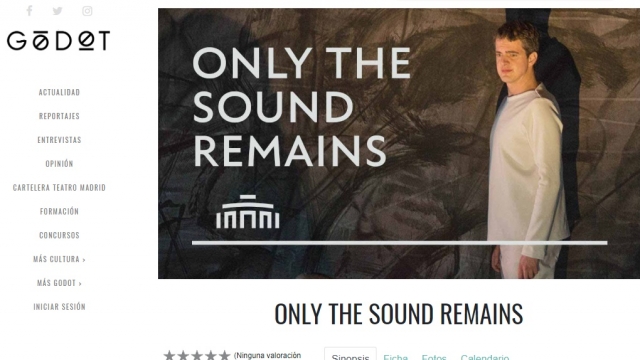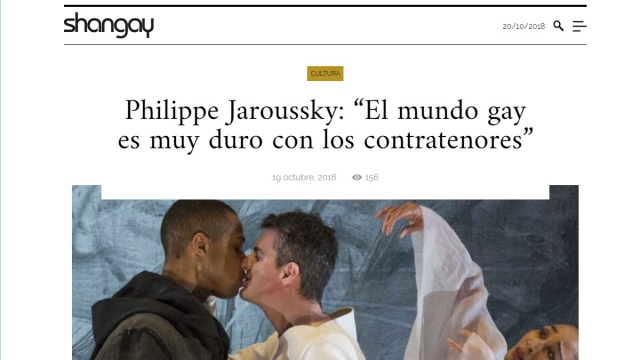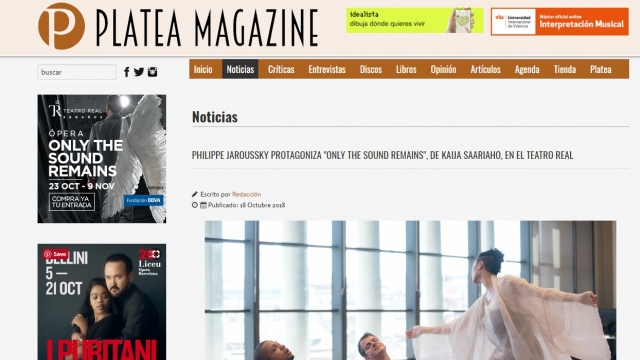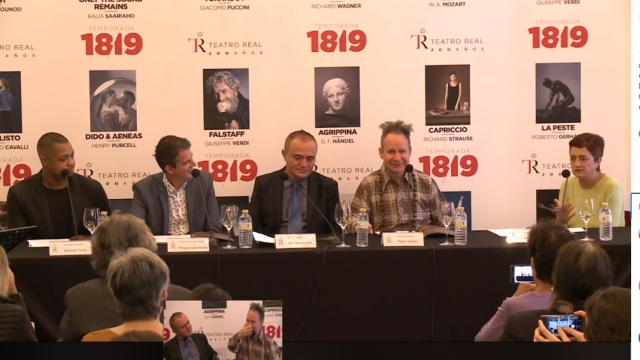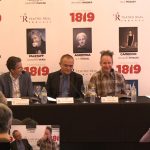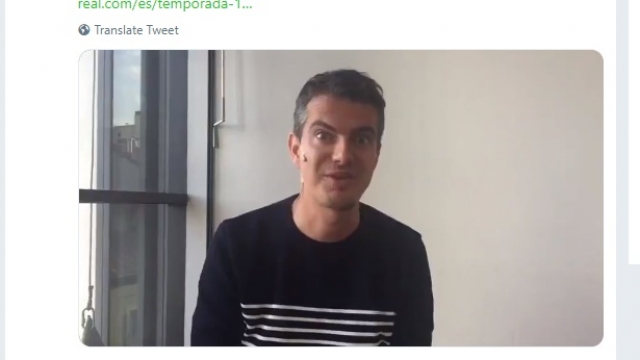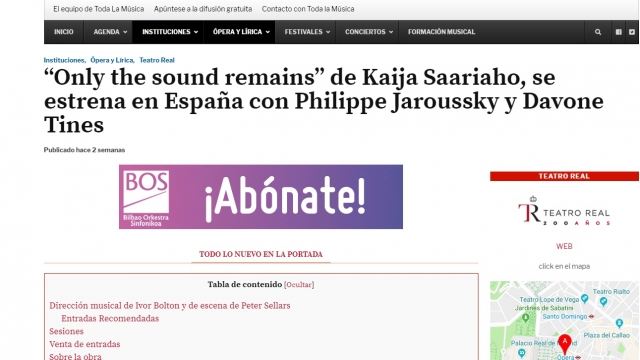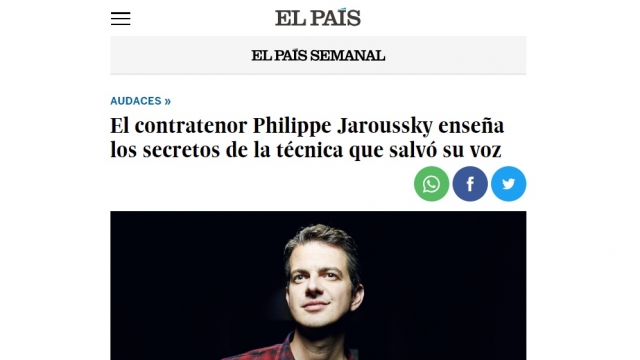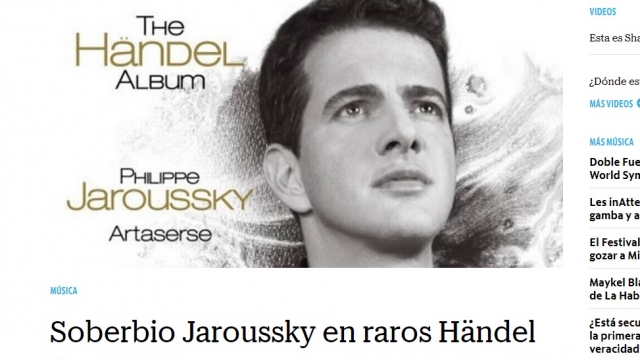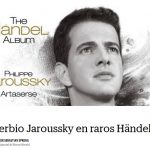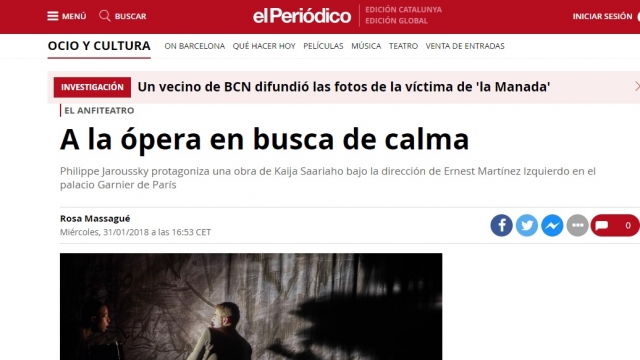2018-10-19, Shangay, by Nacho Fresno
“La música sinfónica, instrumental o una ópera, provoca sentimientos que nunca te va a dar la música pop. La experiencia que estamos proporcionando al público con Only the Sound Remains nunca se podría tener con el pop. Los sentimientos que se tienen al escuchar a Schubert o Stravinski, es imposible… Y cuando afronto ese repertorio, yo también, como cantante, voy a sentir esas cosas.”
~
“Symphonic, instrumental or opera music provokes feelings that pop music will never give you. The experience that we are providing to the audience with Only the Sound Remains could never be had with pop. The feelings that you have when listening to Schubert or Stravinsky, it is impossible … And when I face that repertoire, I also, as a singer, I will feel those things.”
Source/Read more: [x]
Translation to English
This is a fan translation; no infringement of copyright is intended. We believe it fulfills the criteria for “fair use,” discussion and study. Translation by *L
2018-10-19, Shangay, by Nacho Fresno
Philippe Jaroussky: “The gay world is very hard on countertenors”
October 19, 2018
By Nacho Fresno
He is one of the best countertenors in the world: Philippe Jaroussky is among the top five of these singers who, in recent years, have become the superstars of opera. And, as you would expect from a singer of his rank, he doesn’t like to mince his words – at least when it comes to the topic of being gay.
He is in Madrid to star in the Spanish premiere of “Only The Sound Remains” at the Teatro Real – a contemporary opera by Finnish* composer Kaija Saariaho.* A story – or a love story? – between two men, navigating between life and death: “There are very sensual scenes between the two characters, because one, the spirit, is in despair about being one and wants to enter the body of the other, who is a monk. It gives the show a very special dimension,” he says.
Heavily involved in LGBT visibility, he is deeply concerned about what recently happened in Paris, where there have been three homophobic attacks in less than a month. “Friends of mine, very close friends, have suffered and showed enormous courage,” he says, worried.
[original: “Amigos míos, muy cercanos, las han sufrido y han tenido un coraje enorme al ahora de enfrentarse a ellos’”]
He knows the fame of countertenors is founded in the belief of many that they were ‘natural heirs’ of the castrati, who in Baroque, were world megastars. An obvious example is Farinelli, who came to Spain when he was contracted by the court of Felipe V, to cure the monarch’s depression. At the time, the singer had already had a triumphant career in Vienna and London. He was appointed director of the court theaters and stayed in our country.
“The castrati probably had a stronger voice than we have. But being a countertenor is a way of telling the world that being a man today is not talking with a low voice, playing soccer or waging war… That’s an old idea of what it means to be a man. And that is the reason for the sustained success of countertenors since twenty years ago now. A part of the audience recognizes themselves in this alternate way of proposing what it means to be a man,” he assures us about the legend that persecutes singers of this vocal range.
We met Philippe at the Teatro Real, a few days before the premiere, so he could talk to us about everything. About “Only the Sound Remains,” but also about the Baroque, about the great opera divas, or about of the fascination that Classical music awakens in the gay world.
And yes, also about contemporary opera. In the montage that premieres at the Real, he plays with the sound through amplification, giving a new dimension to his voice, which is one of the most desired by opera houses around the world.
The American Peter Sellars, one of the world’s most sought-after stage directors by theaters around the globe, stands out by giving the opera classics a new perspective. His point of view, always groundbreaking, leaves no one indifferent. Here, he faces a new work – a coproduction of the Real with the Opera National de Paris, the Nationale Opera & Ballet of Amsterdam, the Canadian Opera Company of Toronto and the Finnish National Opera of Helsinki.
<image>
‘Only the Sound Remains’ premieres in Spain at the Teatro Real. (Photos: Javier del Real)
SHANGAY ⇒ Everyone says that Only the Sounds Remains is a show that cannot be defined. Challenge question: would you define the opera for Shangay?
PHILIPPE JAROUSSKY⇒ [laughs] To understand this work, a fundamental thing is that it is a meeting between two characters. There are two men on stage. Let’s say it’s the meeting of a young spirit and a monk who knew each other in the past and had, let’s say (it’s my interpretation, but I’m sure it’s like that) a very strong friendship-relationship that resembles a homosexual relationship – maybe not as we would define it today, but as we can imagine that it would have been in past times. Also, this spirit had been the ‘favorite’ of the emperor at that time in Japan. There are very sensual scenes between the two characters, because the spirit is desperate, and wants to enter the body of the monk. This adds a very special dimension. There is a very close link between Davone* [Davone Tines is the baritone who is the co-star of the show, together with the dancer Nora Kimball-Mentzos] and me. A meeting between two characters, yes, but also between two singers, two human beings. I couldn’t name another opera where this happens with similar subtlety to their relationship. It is very interesting to see this show and analyze the relationships between people – who perhaps in this time are sometimes too superficial.
“There may still be a part of heterosexual men who think that having a sensitivity to the arts is showing something too feminine. I do not know…”
SHANGAY ⇒ Can you elaborate?
PHILIPPE JAROUSSKY⇒ Well, sometimes we “consume” people as if we were going to buy. I am not only talking about sex, but friendship as well. I have the impression that there are more and more people who only relate to others based on whether they benefit their lives. That can be something tangible, or in any other sort of way. But it seems to me that friendships, with depth, real friendships, are becoming more and more difficult. We are from the ‘Generation Facebook’ and we have many friends. But what is a friend? What is a strong relationship between two people? It seems to me that this is one question our performance addresses.
SHANGAY ⇒ You move from the Baroque repertoire, in which you are a world star, to contemporary opera without anesthesia. In the Baroque repertoire, there are also many hidden homosexual relationships …
PHILIPPE JAROUSSKY⇒ Sure! In many of the librettos. There are many gay relationships in the classics!
SHANGAY ⇒ Contemporary compositions are a risky and difficult field, less appreciated by the audiences. And there are scores that a singer has to study and learn, which are then represented on fewer occasions … And on top of it, it means throwing yourself into a pool with less water – compared with your usual repertoire that ensures success.
PHILIPPE JAROUSSKY⇒ My career is marked by singing what I like to sing. It is that simple. Most of it has been Baroque, but if we look at the path from the beginning, I’ve been a violinist for twelve years, I’ve played piano for ten … I started studying composition because I’ve always worshipped composers. For me, the composition is at a much higher level than the interpretation. It’s a miracle: starting from scratch and composing. It’s like painting or writing a book. For me it is the top tier, to create something. I create nothing. I have always admired creators. A singer can contribute something special to a work. But the work is the work, regardless of who sings it. Callas may have given much to the character, but Tosca is Tosca. As I have that fascination for the creators, for the current ones I feel it even more – because nowadays, it is very difficult to create something. And Kaija [Kaija Saariaho, the composer of the opera] has a language of her own. Unique. I feel a great admiration for her. As a singer, I feel a great frustration, because I would like to be able to compose. I have ideas, I write, but I do not have the capacity to create an instrumentation. And I would like to be able to say that I want to use my fame, my career, to defend things that I believe in. It would be very easy to dedicate myself only to having the maximum success. Very easy: I’m going to sing the same twenty or thirty arias in recitals, pieces that I know very well, and it works. That’s it! Arias I’ve been singing for twenty years, and the audience goes crazy.
SHANGAY ⇒ You are directly involved in this risky project …
PHILIPPE JAROUSSKY⇒ It isn’t so much. Obviously, people are not getting frantic, or cheer, as in an opera by Vivaldi. The audience does not have the same reaction. Let’s say, not the kind of reaction that is a little hysterical. Music, especially Classical music, is not just for fireworks. There is always another, deeper reading. When I listen to a quintet, Schubert is a much deeper experience, almost philosophical – something I do not have if I listen to Lady Gaga’s album, or a pop album. Symphonic, instrumental or opera music provokes feelings that pop music will never give you. The experience that we are providing to the audience with Only the Sound Remains could never be had with pop. The feelings that you have when listening to Schubert or Stravinsky, it is impossible … And when I face that repertoire, I also, as a singer, I will feel those things. Doing a project like this can be a risk. But for me, it is also a way to find a different kind of audience. Naturally, Baroque music is now very successful. But there is another audience. For example, I have a friend who never studied music, does not know how to read it and, nevertheless, only listens to contemporary music. He goes to all the concerts in Paris. What does this mean? Well, there’s an audience for it, and it’s an audience that does not know me. It’s very interesting, that audience that does not come to the theater to listen to me.
SHANGAY ⇒ Why have the creations of contemporary music – unlike theater, sculpture, painting or literature – failed to connect with a mainstream audience? Why doesn’t that communion exist?
PHILIPPE JAROUSSKY⇒ I do not agree with that idea. You have to be clear which time we’re talking about. Maybe it was like that in the past. Now there are creators, like Kaija, who compose in a way that everyone can understand. Maybe thirty or forty years ago, we had a lot of super special music, super difficult and super experimental. I think that now, contemporary music has moved closer to the audiences. It may take a little more time for them to come back.
<image>
A moment of the rehearsal of ‘Only the Sound Remains’ at the Teatro Real.
SHANGAY ⇒ Let me alter the question: what was at fault for this communion to break up, and the resulting divide during large parts of the 20th century? What was the reason for the divorce between the creators and their audiences?
PHILIPPE JAROUSSKY⇒ I’m telling you: there are many reasons for that divorce. One is that the music was more experimental, more like a demonstration. Very difficult to play, exploring all the sounds, with games, associations. Something, shall we say, more demonstrative. I think that’s why it lost a part of its audience. When someone goes to see an opera or a concert, they want to listen and feel – not see a demonstration. It’s the same for a singer; you have to do more than just sing spectacular notes. Contemporary creation had lost that feeling of being ‘touched’ by music. Now, whoever listens to Kaija will have emotions. It is impossible not to have strong emotions by listening to this music that does not want to prove anything. It all serves the feeling. There is now a whole generation of composers who take advantage of all the previous experimentation, but return to a field that the audience can understand. That’s why this opera seems super interesting to me. A form of modern music that is new, but has the ability to be direct and reach the heart of the audience. We need something more. I know her work and her way of working. It’s like a Van Gogh painting: from afar, it’s a wonder, and up close as well – even more. The more I sing this work, the more I like it – because I discover details. That’s why I recommend to anyone who comes to spend an hour, no more, to get to know to her music. They will enjoy it much more! Search for it on YouTube, and discover it.
“The diva is an idealization of a woman. And maybe gays like that a lot because it comes close to the idea we have of a mother.”
SHANGAY ⇒ Opera is fertile ground for icons, many of them for the gay audiences. Many singers are gay as well. What is it about this world that arouses so much fascination? Every opera house or Lied cycle venue looks like a gay bar.
PHILIPPE JAROUSSKY⇒ Yes, it’s true. For France as well. I think there is a reason – it’s maybe a bit of a cliché, I know – but it still might be difficult for a heterosexual man to assume a form of sensitivity to the arts. It’s the idea – I insist it is a cliché – that a straight man goes to football matches, likes sports … But it’s still like that. That a hetero says “I love opera” is weird. It happens to me. When a boy says to me, “I love La Callas,” I think that, of course, he is gay. I also think that I do not have a very gay audience. To a much higher degree it is women, like Bartoli, who have. The gay opera world is hard on us, the countertenors; we are not big voices. I also think that the image of a strong woman is a big factor. We have an idea of a woman that is maybe a little bit different. The diva is an idealization of this woman. And maybe gays like that a lot because it comes close to the idea we have of a mother. Of the ideal mother, the woman of our life. The diva is a little that, the woman of our life. The idealization of a woman who has magic, a very strong personality. I think it’s a sensitivity to art, to culture, and also a way that allows us to take on aspects of our personality. There still might be a part of heterosexual men who think that having a sensitivity to the arts is making them seem too feminine. I do not know … I have many heterosexual friends who clearly like opera. But it is still easier for us to take on this aspect of our personality.
<image>
A scene from the editing of ‘Only the Sounds Remains’ that is directed by Peter Sellars.
SHANGAY ⇒ The countertenor’s sanctuary is that he is supposed to be the natural heir of castrati. What is your take on that?
PHILIPPE JAROUSSKY⇒ It is that we do not know what the castrati voices really were. The history of these singers has fascinated me from the beginning. It has always touched me. I read a lot about it. To imagine the hard life of a castrato, who came from such a poor world… The tragedy, the sacrifice, it added something to their voices. Not only concerning the physical aspect, but also mentally. Not knowing how they really sang allows everyone to have their own idea of what Farinelli was like. I, for example, know that he sang much more like a man than a woman, because I have seen their scores. The castrati probably had a stronger voice than we have. But being a countertenor is a way of telling the world that being a man today is not talking with a low voice, playing soccer or waging war… That’s an old idea of what it means to be a man. And that is the reason for the sustained success of countertenors since twenty years ago now. A part of the audience recognizes themselves in this alternate way of proposing what it means to be a man.
SHANGAY ⇒ Isn’t that also a bit of a cliché?
PHILIPPE JAROUSSKY⇒ Yes. However, there are a lot of clichés in the gay world as well. There are many gays who only want to be among men. It is very reductive. Sometimes I like to go to bars with friends, but sometimes I tell myself, ‘there are only men in this bar.’ We have to open a little more.
SHANGAY ⇒ Have you ever been recognized in a bar?
PHILIPPE JAROUSSKY⇒ Yes, sometimes. [laughs]
<image>
Peter Sellars, stage director, and Ivor Bolton, musical director of the Teatro Real, at one point during the rehearsal.
*) corrected
Source/Read more: [x]

